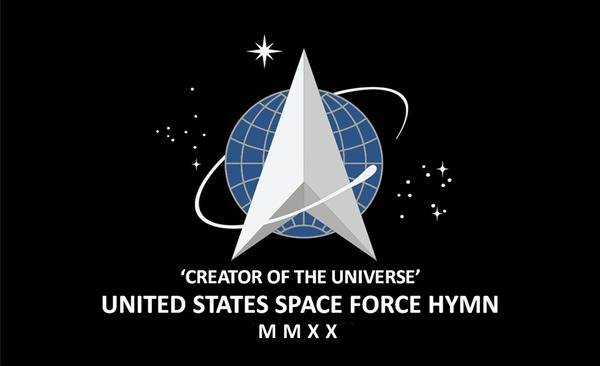
Photo: Modified USSF Flag. Use of released Department of Defense imagery does not constitute product or organizational endorsement of any kind.
NEWS PROVIDED BY
Don Biadog
June 12, 2024
WASHINGTON, June 12, 2024 /Standard Newswire/ -- Churches and military chapels across the nation are experiencing a surge in their expressions of patriotism at this time of the year, due to recent celebrations of Memorial Day and preparations for the 4th of July.
So they are preparing to perform the military hymns and songs. Due to the creation of the United States Space Force hymn, 'Creator of the Universe,' many are thrilled about performing this new addition to their "arsenal" of music, written by former United States Air Force Chaplain, Captain James F. Linzey, who is currently serving as the Chief of Chaplains for the United States National Defense Corps with the rank of Colonel.
Recently, Rev. Bruce Oliver, host of Abundant Living Podcasts, asked, "What is the difference between a military song and a hymn? The answer can help many people who are asking the same thing." Military hymns, like any other hymns, are songs of praise to God, but not all songs are hymns. The military has a song for each branch of the military, and some even have a hymn. Military songs and hymns come about differently than one another. Either the military will commission someone to write an official song, or it will accept what has been written by a civilian.
Hymns, on the other hand, are not commissioned by the military, to avoid the establishment of religion. Military hymns became recognized in the civilian churches before becoming "military hymns." After that, it became natural for military chapels and military bands to adopt them as their hymns and perform them. But they are never officially sanctioned by the military to avoid the establishment of religion. They will simply use them and call them their hymns.
For example, the Air Force song is 'Wild Blue Yonder,' but its hymn is 'Lord, Guard and Guide the Men Who Fly.' The Army song is 'The Army Goes Rolling Along,' but it has no hymn. The Coast Guard song is 'Semper Paratus,' but its hymn is verse one of the Navy Hymn, 'Eternal Father, Strong to Save.' The Marine Corps song is 'The Halls of Montezuma,' but the Marines call it 'The Marine's Hymn,' but it is not a hymn, because it is not a song of praise to God. It is a hymn in name only. The hymn of the Marine Corps is the Navy Hymn, which is sung in Marine Corps chapels, because it is part of the Department of the Navy. The Navy song is 'Anchors Aweigh,' but its hymn is 'Eternal Father, Strong to Save.' The Space Force song is 'Semper Supra,' but its hymn is 'Creator of the Universe,' both written by former Air Force personnel.
The February 29, 2020, edition of the Coffeyville Journal tells the story of how the Space Force Hymn, 'Creator of the Universe,' was written:
On February 12, 2020, Rev. James F. Linzey, who served as a highly decorated Air Force Captain, felt led by Almighty God to write the Space Force Hymn. He set his pen to paper the next day. He had been working on the hymn on an old upright piano that was out of tune in the former Dalton Museum building in Coffeyville, Kansas, which he was cleaning. On February 22, 2020, he completed the hymn, creating what many believe to be his lasting legacy for the Department of the Air Force, for which he served for 12 years. Coffeyville proudly serves as "Home of the United States Space Force Hymn," 'Creator of the Universe.'
This 4th of July will be a spectacular date as we celebrate America's independence, gained by those who gave their lives to make us free. Let us lift our voices as we sing in praise to God our beloved military hymns. As the psalmist said, "I will exalt you, my God and King, and I will bless Your name forever and ever" (Psalm 145:1, MEV).
Commander Manuel "Don" A. Biadog, CHC, USN (Ret.), retired from the US Navy at the conclusion of his tour of duty as the Command Chaplain, MCAS Miramar, San Diego, California. He served for nearly 30 years with honors. He was awarded the Presidential Lifetime Achievement Award in April 2024, and he was the first military chaplain to use as a pew Bible the Modern English Version (MEV) Bible, edited by Dr. James F. Linzey, author of the Space Force Hymn and general editor of the New Tyndale Version (NTV) Bible translation. Chaplain Biadog serves as the Deputy Chief of Chaplains for the United States National Defense Corps with the rank of Captain.
SOURCE: Don Biadog
CONTACT: Don Biadog, chapbiadog@yahoo.com
Related Links
UnitedStatesSpaceForceHymn.com
Sheet Music Plus




 Sign Up to Receive Press Releases:
Sign Up to Receive Press Releases: